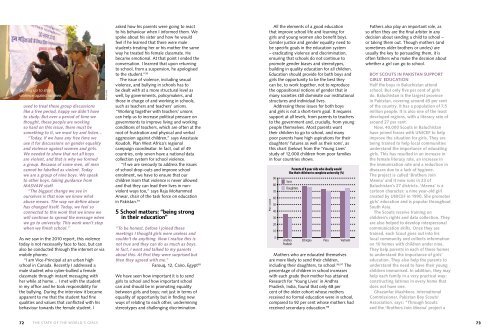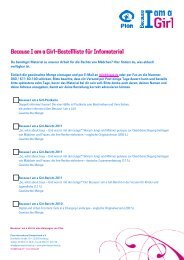Because I am a girl: The State of the World's ... - Plan Deutschland
Because I am a girl: The State of the World's ... - Plan Deutschland
Because I am a girl: The State of the World's ... - Plan Deutschland
Create successful ePaper yourself
Turn your PDF publications into a flip-book with our unique Google optimized e-Paper software.
Signing up to stop<br />
violence against women.<br />
used to treat <strong>the</strong>se group discussions<br />
like a free period, happy we didn’t have<br />
to study. But over a period <strong>of</strong> time we<br />
thought, <strong>the</strong>se people are working<br />
so hard on this issue, <strong>the</strong>re must be<br />
something to it, we must try and listen…<br />
“Today, if we have any free time we<br />
use it for discussions on gender equality<br />
and violence against women and <strong>girl</strong>s.<br />
We needed to show that not all boys<br />
are violent, and that is why we formed<br />
a group. <strong>Because</strong> <strong>of</strong> some men, all men<br />
cannot be labelled as violent. Today<br />
we are a group <strong>of</strong> nine boys. We speak<br />
to o<strong>the</strong>r boys, taking guidance from<br />
MASVAW staff.<br />
“<strong>The</strong> biggest change we see in<br />
ourselves is that now we know what<br />
abuse means. <strong>The</strong> way we define abuse<br />
has changed itself. Today, we feel so<br />
connected to this work that we know we<br />
will continue to spread <strong>the</strong> message when<br />
we go to university. This work won’t stop<br />
when we finish school.”<br />
As we saw in <strong>the</strong> 2010 report, this violence<br />
today is not necessarily face to face, but can<br />
also be conducted through <strong>the</strong> internet or via<br />
mobile phones:<br />
“I <strong>am</strong> Vice-Principal at an urban high<br />
school in Canada. Recently I addressed a<br />
male student who cyber-bullied a female<br />
classmate through instant messaging with<br />
her while at home… I met with <strong>the</strong> student<br />
in my <strong>of</strong>fice and he took responsibility for<br />
<strong>the</strong> bullying. During <strong>the</strong> interview it bec<strong>am</strong>e<br />
apparent to me that <strong>the</strong> student had fine<br />
qualities and values that conflicted with his<br />
behaviour towards <strong>the</strong> female student. I<br />
M A S V A W<br />
asked how his parents were going to react<br />
to his behaviour when I informed <strong>the</strong>m. We<br />
spoke about his sister and how he would<br />
feel if he learned that <strong>the</strong>re were male<br />
students treating her or his mo<strong>the</strong>r <strong>the</strong> s<strong>am</strong>e<br />
way he treated his female classmate. He<br />
bec<strong>am</strong>e emotional. At that point I ended <strong>the</strong><br />
conversation. I learned that upon returning<br />
to school, from a suspension, he apologised<br />
to <strong>the</strong> student.” 93<br />
<strong>The</strong> issue <strong>of</strong> violence, including sexual<br />
violence, and bullying in schools has to<br />
be dealt with at a more structural level as<br />
well, by governments, policymakers, and<br />
those in charge <strong>of</strong> and working in schools,<br />
such as teachers and teachers’ unions.<br />
“Working toge<strong>the</strong>r with teachers’ unions<br />
can help us to increase political pressure on<br />
governments to improve living and working<br />
conditions <strong>of</strong> teachers, which are <strong>of</strong>ten at <strong>the</strong><br />
root <strong>of</strong> frustration and physical and verbal<br />
aggression against children,” says Anastasie<br />
Koudoh, <strong>Plan</strong> West Africa’s regional<br />
c<strong>am</strong>paign coordinator. In fact, out <strong>of</strong> 49<br />
countries, only seven have a national data<br />
collection system for school violence.<br />
“If we are seriously to address <strong>the</strong> issues<br />
<strong>of</strong> school drop-outs and improve school<br />
enrolment, we have to ensure that our<br />
children learn that violence is never allowed<br />
and that <strong>the</strong>y can lead <strong>the</strong>ir lives in nonviolent<br />
ways too,” says Raja Moh<strong>am</strong>med<br />
Anwar, chair <strong>of</strong> <strong>the</strong> task force on education<br />
in Pakistan. 94<br />
5 School matters: “being strong<br />
in <strong>the</strong>ir education”<br />
“To be honest, before I joined <strong>the</strong>se<br />
meetings I thought <strong>girl</strong>s were useless and<br />
couldn’t do anything. Now I realise this is<br />
not true and <strong>the</strong>y can do as much as boys.<br />
In fact, I went and talked to my parents<br />
about this. At first <strong>the</strong>y were surprised but<br />
<strong>the</strong>n <strong>the</strong>y agreed with me.”<br />
Farouq, 12, Cairo, Egypt 95<br />
We have seen how important it is to send<br />
<strong>girl</strong>s to school and how important school<br />
can and should be in promoting equality<br />
between <strong>girl</strong>s and boys; not just in terms <strong>of</strong><br />
equality <strong>of</strong> opportunity but in finding new<br />
ways <strong>of</strong> relating to each o<strong>the</strong>r, undermining<br />
stereotypes and challenging discrimination.<br />
All <strong>the</strong> elements <strong>of</strong> a good education<br />
that improve school life and learning for<br />
<strong>girl</strong>s and young women also benefit boys.<br />
Gender justice and gender equality need to<br />
be specific goals in <strong>the</strong> education system<br />
– eradicating violence and discrimination,<br />
ensuring that schools do not continue to<br />
promote gender biases and stereotypes,<br />
building in quality education for all children.<br />
Education should provide for both boys and<br />
<strong>girl</strong>s <strong>the</strong> opportunity to be <strong>the</strong> best <strong>the</strong>y<br />
can be, to work toge<strong>the</strong>r, not to reproduce<br />
<strong>the</strong> oppositional notions <strong>of</strong> gender that in<br />
many societies still dominate our institutional<br />
structures and individual lives.<br />
Addressing <strong>the</strong>se issues for both boys<br />
and <strong>girl</strong>s is not a short-term goal. It requires<br />
support at all levels, from parents to teachers<br />
to <strong>the</strong> government and, crucially, from young<br />
people <strong>the</strong>mselves. Most parents want<br />
<strong>the</strong>ir children to go to school, and many<br />
poor parents have high aspirations for <strong>the</strong>ir<br />
daughters’ futures as well as <strong>the</strong>ir sons’, as<br />
this chart (below) from <strong>the</strong> ‘Young Lives’<br />
study <strong>of</strong> 12,000 children from poor f<strong>am</strong>ilies<br />
in four countries shows.<br />
Per cent<br />
90<br />
80<br />
70<br />
60<br />
50<br />
40<br />
30<br />
20<br />
10<br />
0<br />
Andhra<br />
Pradesh<br />
Parents <strong>of</strong> 8 year olds who ideally would<br />
like <strong>the</strong>ir children to complete university (%)<br />
Sons<br />
Daughters<br />
Ethiopia<br />
Peru<br />
Vietn<strong>am</strong><br />
Mo<strong>the</strong>rs who are educated <strong>the</strong>mselves<br />
are more likely to send <strong>the</strong>ir children,<br />
including <strong>the</strong>ir daughters, to school. 96,97 <strong>The</strong><br />
percentage <strong>of</strong> children in school increases<br />
with each grade <strong>the</strong>ir mo<strong>the</strong>r has attained.<br />
Research for ‘Young Lives’ in Andhra<br />
Pradesh, India, found that only 68 per<br />
cent <strong>of</strong> <strong>the</strong> older cohort whose mo<strong>the</strong>rs<br />
received no formal education were in school,<br />
compared to 92 per cent whose mo<strong>the</strong>rs had<br />
received secondary education. 98<br />
Fa<strong>the</strong>rs also play an important role, as<br />
so <strong>of</strong>ten <strong>the</strong>y are <strong>the</strong> final arbiter in any<br />
decision about sending a child to school –<br />
or taking <strong>the</strong>m out. Though mo<strong>the</strong>rs (and<br />
sometimes older bro<strong>the</strong>rs or uncles) are<br />
usually <strong>the</strong> key to persuading <strong>the</strong>m, it is<br />
<strong>of</strong>ten fa<strong>the</strong>rs who make <strong>the</strong> decision about<br />
whe<strong>the</strong>r a <strong>girl</strong> can go to school.<br />
Boy Scouts in Pakistan support<br />
<strong>girl</strong>s’ education<br />
Half <strong>the</strong> boys in Baluchistan attend<br />
school. But only five per cent <strong>of</strong> <strong>girl</strong>s<br />
do. Baluchistan is <strong>the</strong> largest province<br />
in Pakistan, covering around 45 per cent<br />
<strong>of</strong> <strong>the</strong> country. It has a population <strong>of</strong> 7.5<br />
million people. It is also one <strong>of</strong> <strong>the</strong> least<br />
developed regions, with a literacy rate <strong>of</strong><br />
around 27 per cent.<br />
Now, 40,000 Scouts in Baluchistan<br />
have joined forces with UNICEF to help<br />
improve <strong>the</strong> situation for <strong>girl</strong>s. <strong>The</strong>y are<br />
being trained to help local communities<br />
understand <strong>the</strong> importance <strong>of</strong> educating<br />
<strong>girl</strong>s. This has resulted in an increase in<br />
<strong>the</strong> female literacy rate, an increase in<br />
<strong>the</strong> immunisation rate and a reduction in<br />
diseases due to a lack <strong>of</strong> hygiene.<br />
<strong>The</strong> project is called ‘Bro<strong>the</strong>rs Join<br />
Meena’ and it now runs in 23 <strong>of</strong><br />
Baluchistan’s 27 districts. ‘Meena’ is a<br />
cartoon character; a nine year-old <strong>girl</strong><br />
created by UNICEF in 1990. She promotes<br />
<strong>girl</strong>s’ education and is popular throughout<br />
South Asia.<br />
<strong>The</strong> Scouts receive training on<br />
children’s rights and data collection. <strong>The</strong>y<br />
are also helped to develop interpersonal<br />
communication skills. Once <strong>the</strong>y are<br />
trained, each Scout goes out into his<br />
local community and collects information<br />
on 10 homes with children under nine.<br />
<strong>The</strong>y help parents in each <strong>of</strong> <strong>the</strong>se homes<br />
to understand <strong>the</strong> importance <strong>of</strong> <strong>girl</strong>s’<br />
education. <strong>The</strong>y also help <strong>the</strong> parents to<br />
understand <strong>the</strong> need to have <strong>the</strong>ir young<br />
children immunised. In addition, <strong>the</strong>y may<br />
help each f<strong>am</strong>ily in a very practical way;<br />
constructing latrines in every home that<br />
does not have one.<br />
Ghazanfar Mashkoor, International<br />
Commissioner, Pakistan Boy Scouts’<br />
Association, says: “Through Scouts<br />
and <strong>the</strong> ‘Bro<strong>the</strong>rs Join Meena’ project a<br />
72 <strong>the</strong> s tate <strong>of</strong> <strong>the</strong> world’s <strong>girl</strong>s 73



